United States
News Biography Bibliography Critical Bibliography (Articles, Books, Reviews) Theses and Dissertations Reviews Links Exclusive Interviews and Fora Expositions|Events and Lectures Bookworm University of Rhode Island & University of Arizona World Voices Festival
News
Biography
Jean-Philippe Toussaint was born November 29, 1957 in Brussels, Belgium where he currently lives today. After finishing his studies in Paris, France in 1978, Toussaint earned degrees in political science, and in 1979, modern history. Toussaint began writing in 1979 after having read Crime and Punishment by Fyodor Dostoyevsky. As written in Toussaint’s personal account, he states, “I do not know if it is necessary to see a direct link, but in any case…a month after having read Crime and Punishment I began to write.” In the years following, Toussaint has written nine books, including the award-winning Running Away (2005), that have each been translated into more than twenty languages.
His first novel, The Bathroom (1985) was started in a room in Tournelles, and the first edition only took a month to complete. The Bathroom is narrated by a man in his late twenties who is living in Paris. As the title suggests, the story centers around the bathroom, where the protagonist devotes most of his time hiding out. Eventually he resolves to leave the bathroom, a decision that leads to rather uneventful adventures, but he always returns to his hideout.
With his unique style Toussaint has certainly left a mark in the world of literature. He claims to glean ideas from his personal experiences and writes in a minimalist fashion. While the ideas buried between the pages tend to be philosophical, the titles of his books and the actual writing are rather simple. Through this medium of writing, Toussaint conveys complex ideas that manifest in the mendacity of everyday life.
However, Toussaint also entered the world of filmmaking, having worked on three films to date: Monsieur (1989), La Sévillare (1992), and The Ice Rink (1999). Toussaint began his film career by taking part in a few short films, his first being “Les dents d’affaires”, in his teenage years. Ten years later, Toussaint started work on his film Monsieur, a black and white feature that tells the tale of a man named Monsieur. In this comedy, Monsieur has been living with his girlfriend and her family, but he is forced to move out when his girlfriend brings home a new boyfriend. In his review of the film, Clark Fountaine (All Movie Guides) writes: “By the end of the film, it looks as though something good will come of it all.” Toussaint’s third film, The Ice Rink, debuted ten years after and was nominated for two film festival awards, winning one in 2000 at the Stony Brook Film Festival
In addition to writing nine books and putting his name on three major films, Toussaint is also a skilled photographer. In the Nanzen-je gardens of Kyoto, Japan, Toussaint took his first artistic photograph. He has had his photography displayed in Brussels as well as in Kyoto at the Contemporary Art Space of Osaka.
Today, Jean-Philippe Toussaint is regarded as a prominent European writer, filmmaker, and photographer.
Bibliography
Emotions. 2025. Trans. Mark Polizzotti. Other Press, 2025.
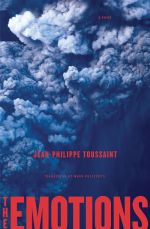
Naked. 2016. Trans. Edward Gauvin. Dalkey Archive Press, 2016.
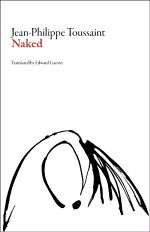
Urgency and patience. 2012. Trans. Edward Gauvin. Dalkey Archive Press, 2015.
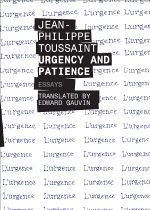
Both a sense of urgency and a goodly amount of patience are required for any writer to produce a novel. Moving between these two poles, Jean-Philippe Toussaint presents a series of short essays on the art of writing, both his own and that of writers he has admired, such as Kafka, Beckett, Dostoyevsky, and Proust.
The Truth about Marie. 2009. Trans. Matthew B. Smith. Urbana, Illinois: Dalkey Archive Press, 2011.
Moving through a variety of locales and adventures, The Truth about Marie revisits the unnamed narrator of Toussaint’s acclaimed Running Away, reporting on his now disintegrated relationship with the titular Marie—the story switching deftly between first- and third- person as the narrator continues to drift through life, and Marie does her best to get on with hers. Like all of Toussaint’s novels, The Truth about Marie‘s plot matters far less than its pace and tempo, its chain of images, its sequence of events. From pouring rain in Paris to blazing fires on the island of Elba, from moments of intense action to perfectly paced lulls, The Truth about Marie relies on a series of contrasts to tell a beguiling, and finally touching, story of intimacy forever being regained and lost.
Zidane's Melancholy. 2006. London: Lawrence & Wishart Ltd, 2007.
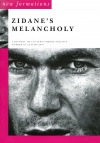
Zidane watched the Berlin sky, not thinking of anything, a white sky flecked with grey clouds lined with blue, one of those windy skies, immense and changing, of the Flemish painters, Zidane watched the Berlin sky over the Olympic stadium on the evening of the 9th of July 2006, and felt with poignant intensity the sensation of being there, simply there, in Berlin's Olympic stadium, at this precise moment in time, on the evening of the football World Cup final. No doubt it was a matter only of form and melancholy on the evening of this final. In the first instance, pure form: the penalty converted in the seventh minute, an indolent Panenka1 that hit the crossbar, passed over the line and re-exited the goal, a billiard-ball trajectory that flirted with Geoff Hurst's fabled shot at Wembley in 1966.2 But this was still only a quotation, an inadvertent homage to a legendary World Cup moment. Zidane's true act on the evening of this final - a sudden gesture like an overflow of black bile into the solitary night - will occur only later and make one forget the rest, the end of the match and the extra time, the shots at the goal and the winner, a decisive, brutal, prosaic, novelistic act: a perfect moment of ambiguity under the Berlin sky, a few dizzying seconds of ambivalence, where beauty and blackness, violence and passion, come into contact and provoke the short-circuit of a wholly unscripted act (un geste inédit). Zidane's headbutt had the suddenness and suppleness of the calligrapher's stroke. If it took only a few seconds to accomplish, it could occur only at the end of a slow process of maturation, a genesis long, invisible and secret. Zidane's act knows not the aesthetic categories of the beautiful or the sublime, it stands beyond the moral categories of good and evil, its value, its strength and its substance …
Running Away. 2005. Trans. Matthew B. Smith. Urbana, Illinois: Dalkey Archive Press, 2009. Winner of the Medicis Prize.
A European man arrives in Shanghai, ostensibly on vacation, yet a small task given him by his Parisian girlfriend Marie starts a series of complications. There is a mysterious Chinese man and a manila envelope full of cash. Later, he meets a woman at an art gallery and they agree to travel together to Beijing, yet when he joins her at the train station, the Chinese man is along. Events eclipse explanations, and soon he surrenders himself to the on-rush of experience.
Toussaint’s latest novel pulls the reader into a jet-lag reality, a confusion of time and place that is both particularly modern and utterly real. The Chaplinesque slapstick of his acclaimed early works The Bathroom and Camera is here replaced by an ever-unfolding fabric of questions, coincidences, and misapprehensions large and small. The mature Toussaint shows himself to be no less ingenious an inventor of existential dilemmas, but with a new, surprising tenderness, and a deepened concern for the inexpressible immediacy and sensuality of human experience.
Making love. 2002. Trans. Linda Coverdale. The New Press New York, 2004.
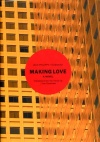
A stark, ultramodern novel of an affair's disintegration.
An immediate bestseller in France, Making Love is an original and daring retelling of a classic theme: the end of an affair. As much an exploration of setting and place as it is of the affair that comes apart in them, Making Love follows a couple's final days together in Japan. Toussaint writes with an economy and restraint that evoke the distinct imagery of film while allowing a startling proximity to the feelings of his characters. The result is vertiginous, standing traditional images on their head and transposing the conflict and confusion of lost intimacy onto the labyrinthine ultramodernism of Tokyo and Kyoto. Brilliantly written and strikingly original, this is a stunning work of new fiction from one of Europe's most promising authors.
Self-Portrait abroad. 2000. Trans. John Lambert. Urbana, Illinois: Dalkey Archive Press, 2010.
In Self-Portrait Abroad, our narrator—a Belgian author much like Toussaint himself—travels the globe, finding the mundane blended everywhere with the exotic: With his usual poker face, he keeps up on Corsican gossip in Tokyo and has a battle of nerves in a butcher shop in Berlin; he wins a boules tournament in Cap Corse, takes in a strip club in Japan’s historic Nara, gets pulled through Hanoi on a cycle rickshaw, and has a chance encounter on the road from Tunis to Sfax. Tales of a cosmopolitan at home in a strangely familiar world, Self-Portrait Abroad casts the entire globe in a cool but playful light, reminding us that, wherever we go,we take our own eyes with us…
Television. 1997. Trans. Jordan Stump. Urbana, Illinois: Dalkey Archive Press, 2007.
The amusingly odd protagonist and narrator of Jean-Philippe Toussaint's novel is an academic on sabbatical in Berlin to work on his book about Titian. With his research completed, all he has left to do is sit down and write. Unfortunately, he can't decide how to refer to his subject—Titian, le Titien, Vecellio, Titian Vecellio—so instead he starts watching TV continuously, until one day he decides to renounce the most addictive of twentieth-century inventions.
As he spends his summer still not writing his book, he is haunted by television, from the video surveillance screens in a museum to a moment when it seems everyone in Berlin is tuned in to Baywatch.
One of Toussaint's funniest antiheroes, the protagonist of Television turns daily occurrences into an entertaining reflection on society and the influence of television on our lives.
Reticence. 1991. Trans. John Lambert. Urbana, Illinois: Dalkey Archive Press, 2012.
“A little thing happened to me. Which could just as easily have happened to you. You’re on vacation in a hotel with your son in a small village and you’re about to go see some friends, but something holds you back, a mysterious reticence that prevents you from going to find them. Here is the novel of this reticence, small and specific, and of the fears that it instigates, little by little. Because not only are your friends not there when you do decide to go find them, but, several days later, you find a dead cat in the harbor, a black cat floating in front of you on the water…”
In Jean-Philippe Toussaint’s take on the detective novel, we find a man on vacation in a tiny village, where a writer named Biaggi appears to be keeping him under surveillance. To what end? Ah, but it’s far more pleasant to enjoy the Mediterranean night air than to look for answers, make deductions, or get upset—isn’t it?
Camera. 1989. Trans. Matthew B. Smith. Urbana, Illinois: Dalkey Archive Press, 2008.
In this improbable love story, Toussaint creates a character who is obsessed with himself: how he does things and all the ways he might have done them, how he thinks, why he thinks the way that he thinks, how he might do or think otherwise. What happens? He takes driving lessons, goes grocery shopping, spends endless hours with an adorable employee of the driving school he attends. And though he is aloof, though caught up in his own actions and in the movement of his own thoughts—he somehow emerges as surprisingly insightful and also very funny. In Toussaint's touching novel, we come to know this character intimately and yet know almost nothing about him. These two extremes, existing together, are at the heart of Toussaint's remarkable style.
Monsieur. 1986. Trans. John Lambert. Urbana, Illinois: Dalkey Archive Press, 2008.
Meet Monsieur, your hero, a successful young executive in Paris whose daily life you will follow in precise detail. He is nothing if not unremarkable. Meet his secretary, his nieces, his fiancée and her parents, his neighbor whose scientific reports Monsieur unwittingly types out. What will happen? This and that. Monsieur will attend a party. He will babysit. But most of all, Monsieur will muse, and so will you muse, on everything from the night sky to a Rotring pen. And it will be very funny. Here Toussaint turns the ordinary into the extraordinary, an unremarkable anti-hero into a deadpan wit.
The Bathroom. 1985. Trans. Nancy Amphoux and Paul De Angelis. Urbana, Illinois: Dalkey Archive Press, 2008.
First published in France in 1985, The Bathroom was Jean-Philippe Toussaint's debut novel, and it heralded a new generation of innovative French literature. In this playful and perplexing book, we meet a young Parisian researcher who lives inside his bathroom. As he sits in his tub meditating on existence (and refusing to tell us his name), the people around him—his girlfriend, Edmondsson, the Polish painters in his kitchen—each in their own way further enables his peculiar lifestyle, supporting his eccentric quest for immobility. But an invitation to the Austrian embassy shakes up his stable world, prompting him to take a risk and leave his bathroom . . .
Critical Bibliography (Articles, Books, Reviews)
Theses and Dissertations
Dissertations Available Online:
Reviews
Reviews Updated by Alain-Philippe Durand and Khanh Van, University of Arizona, May 2011
Monsieur, Mes bureaux and Self-Portrait Abroad
Television
Running Away
Links
Links Updated by Alain-Philippe Durand and Khanh Van, University of Arizona, May 2011
Exclusive Interviews and Fora
Expositions|Events and Lectures
Bookworm
University of Rhode Island & University of Arizona
Jean-Philippe Toussaint's Visit and Lecture in Prof. Alain-Philippe Durand's seminar on the Non-Places in Contemporary French Literature and Cinema at the University of Rhode Island in Kingston, USA on April 27-28, 2010. Film directed, edited, and produced by Alex DeCiccio.
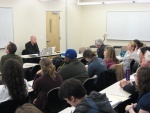 Toussaint's lecture at the University of Rhode Island in Kingston, April 27, 2010
Toussaint's lecture at the University of Rhode Island in Kingston, April 27, 2010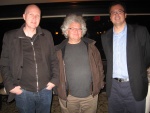 Toussaint, François Bon, and Alain-Philippe Durand in Narragansett, RI, April 27, 2010
Toussaint, François Bon, and Alain-Philippe Durand in Narragansett, RI, April 27, 2010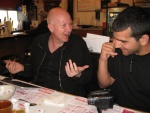 Toussaint and Alex DeCiccio in Wakefield, RI, April 28, 2010
Toussaint and Alex DeCiccio in Wakefield, RI, April 28, 2010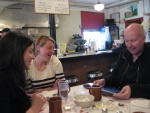 Toussaint, Brigid Flynn, and Isadora Nicholas in Wakefield, RI, April 28, 2010
Toussaint, Brigid Flynn, and Isadora Nicholas in Wakefield, RI, April 28, 2010Jean-Philippe Toussaint dialogues via Skype from a bookstore in Liege, Belgium with Prof. Alain-Philippe Durand's students in the course LASC 195A Digital Humanities at the University of Arizona in Tucson, USA on March 23, 2011.
As part of Prof. Alain-Philippe Durand's course LASC 195A Digital Humanities (Spring 2011) at the University of Arizona, Stephen Johnson wrote, composed, produced, and performed the original song "Making Sex Not Love" based on his reading of Toussaint's novel Making Love. Listen to Stephen Johnson's Song
As part of Prof. Alain-Philippe Durand's course LASC 195A Digital Humanities (Spring 2011) at the University of Arizona, Jared Simte created a visual project based on his reading of Toussaint's novel Running Away Read Jared Simte's visual project on Toussaint's "Running Away"























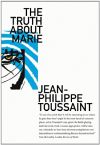
.jpg/100px-USA-fuir-(2009).jpg)
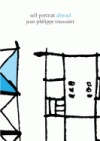
.jpg/100px-USA-la-television(2007).jpg)
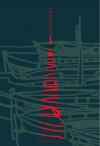
.jpg/100px-USA-l-appareil-photo(2008).jpg)
.jpg/100px-USA-monsieur(2008).jpg)
.jpg/110px-USA-GB-monsieur(1991).jpg)
.jpg/100px-USA-GB-la-salle-de-bain(1986).jpg)
.jpg/110px-USA-la-salle-de-bain(2008).jpg)